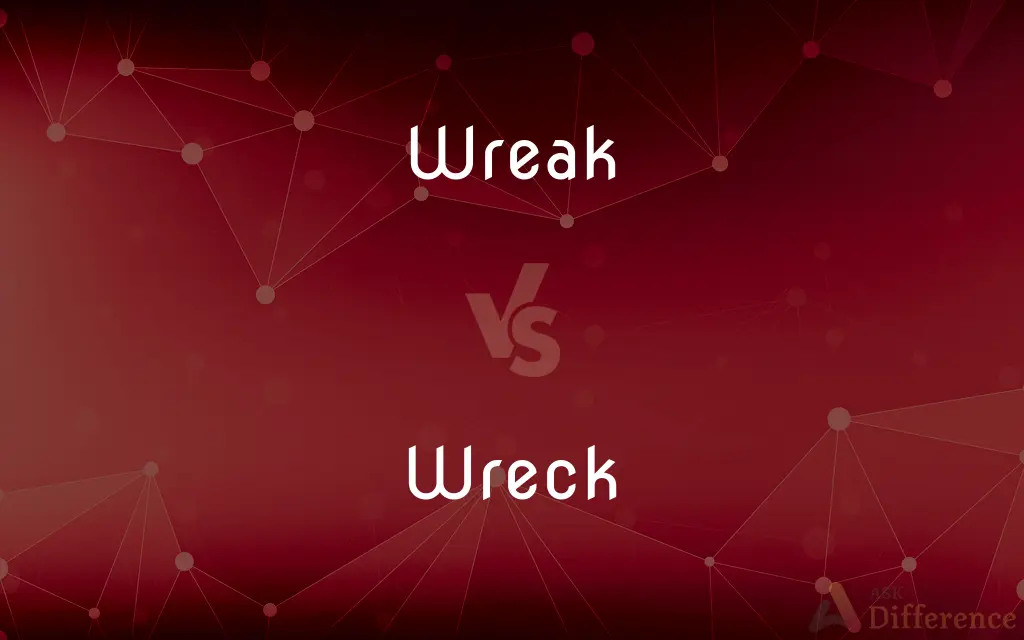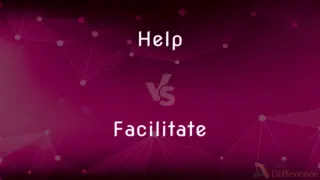Wreak vs. Wreck — What's the Difference?
By Fiza Rafique & Maham Liaqat — Updated on April 28, 2024
"Wreak" means to cause or inflict (usually damage or destruction), while "wreck" refers to something that has been badly damaged or destroyed.

Difference Between Wreak and Wreck
Table of Contents
ADVERTISEMENT
Key Differences
"Wreak" is a verb that implies causing harm or damage, often used in the phrase "wreak havoc," which suggests causing chaos or destruction, whereas "wreck" can be both a verb and a noun, referring to the act of destroying or the state of being destroyed, respectively.
To "wreak vengeance" on someone is to inflict punishment or harm, emphasizing the deliberate nature of the act, while to "wreck a car" involves damaging it severely, often implying an accident rather than a deliberate action.
The effects of "wreaking" are typically emotional, financial, or physical harm caused by deliberate actions, whereas "wrecking" something usually results in its physical destruction or ruin.
You might "wreak" something less tangible, like fear or havoc, which doesn’t necessarily involve physical destruction, on the other hand, "wreck" is used when referring to tangible objects or entities being physically damaged or rendered nonfunctional.
In a legal or formal context, to "wreak" could involve imposing consequences through systematic actions, while to "wreck" might refer to the act of physically damaging property or infrastructure.
ADVERTISEMENT
Comparison Chart
Part of Speech
Verb
Verb (also a noun as 'a wreck')
Implication
Infliction of harm, often deliberate
Physical damage, often accidental
Common Phrases
Wreak havoc, wreak vengeance
Shipwreck, car wreck, wrecking ball
Tangibility
Usually intangible effects
Usually tangible objects
Intentionality
Often intentional
Can be accidental or intentional
Compare with Definitions
Wreak
To bring about (an undesirable consequence).
The new policy could wreak chaos in the transportation sector.
Wreck
To smash or break forcefully.
The demolition team wrecked the old building.
Wreak
To cause a large amount of harm or damage.
The storm wreaked devastation across the coast.
Wreck
To spoil or ruin severely.
His last-minute withdrawal wrecked our plans.
Wreak
To execute vengeance or punishment.
The villain planned to wreak revenge on the hero’s allies.
Wreck
An act of destroying or the state of being destroyed.
The aftermath of the hurricane was a wreck.
Wreak
To unleash or let loose.
The director wreaked his artistic vision on the film project.
Wreck
A vehicle or ship that has been destroyed.
Divers explored the sunken wreck off the coast.
Wreak
To inflict (something harmful or damaging).
He vowed to wreak his anger on those responsible.
Wreck
To involve in a wreck.
She wrecked her car in a traffic accident.
Wreak
Cause (a large amount of damage or harm)
The environmental damage wreaked by ninety years of phosphate mining
Torrential rainstorms wreaked havoc yesterday
Wreck
The destruction of a ship at sea; a shipwreck
The survivors of the wreck
Wreak
To bring about (damage or destruction, for example)
Wreak havoc.
Wreck
Something, especially a vehicle or building, that has been badly damaged or destroyed
The wreck of their marriage
The plane was reduced to a smouldering wreck
Wreak
To inflict (vengeance or punishment) upon a person.
Wreck
A person whose physical or mental health or strength has failed
The scandal left the family emotional wrecks
Wreak
To give vent to or act upon (one's feelings)
"He sought for some excuse to wreak his hatred upon Tarzan" (Edgar Rice Burroughs).
Wreck
Cause the destruction of (a ship) by sinking or breaking up
He was drowned when his ship was wrecked
Wreak
(Archaic) To take vengeance for; avenge.
Wreck
Destroy or severely damage (a structure, vehicle, or similar)
The blast wrecked 100 houses
Wreak
(transitive) To cause harm; to afflict; to inflict; to harm or injure; to let out harm.
The earthquake wreaked havoc in the city.
She wreaked her anger on his car.
Wreck
Engage in breaking up badly damaged vehicles or demolishing old buildings to obtain usable spares or scrap.
Wreak
(transitive) To chasten, or chastise/chastize, or castigate, or punish, or smite.
The police abused their authority to wreak an innocent.
The criminal has been wreaked by the Judge to spend a year in prison.
Wreck
The act of destroying or the state of being destroyed; destruction
"The filmmaker ... was hardly the first person to blame misguided agriculture for the wreck of the plains" (Timothy Egan).
Wreak
(archaic) To inflict or take vengeance on.
Wreck
Accidental destruction of a ship; a shipwreck.
Wreak
(archaic) To take vengeance for.
Wreck
The stranded hulk of a severely damaged ship.
Wreak
(intransitive) reek
Wreck
Fragments of a ship or its cargo cast ashore by the sea after a shipwreck; wreckage.
Wreak
Revenge; vengeance; furious passion; resentment.
Wreck
An automobile or railroad collision or accident
Witnessed a wreck on the highway.
Wreak
Punishment; retribution; payback.
Wreck
The remains of something that has been wrecked, especially an automobile that has crashed
Walked away unharmed from the wreck.
Wreak
To reck; to care.
Wreck
Something that is dilapidated or worn out
Still driving that wreck of a car.
Living in a wreck of a house.
Wreak
To revenge; to avenge.
He should wreake him on his foes.
Another's wrongs to wreak upon thyself.
Come wreak his loss, whom bootless ye complain.
Wreck
A person who is physically or mentally worn out.
Wreak
Revenge; vengeance; furious passion; resentment.
Wreck
To cause the destruction of in a collision
Wrecked the car by hitting a tree.
Wreak
Cause to happen or to occur as a consequence;
I cannot work a miracle
Wreak havoc
Bring comments
Play a joke
The rain brought relief to the drought-stricken area
Wreck
To dismantle or raze; tear down.
Wreck
To cause to undergo ruin or disaster
An argument that wrecked their friendship. See Usage Note at wreak.
Wreck
To suffer destruction or ruin; become wrecked
A ship that wrecked on the rocks.
Wreck
(Informal) To experience or cause an accident in which the vehicle one is riding in is badly damaged
They were speeding over 70 miles an hour when they wrecked.
Wreck
To work as a wrecker.
Wreck
The remains of something that has been severely damaged or worn down.
Wreck
An event in which something is damaged through collision.
Wreck
A shipwreck: an event in which a ship is heavily damaged or destroyed.
Wreck
Goods, etc. cast ashore by the sea after a shipwreck.
Wreck
(ornithology) A large number of birds that have been brought to the ground, injured or dead, by extremely adverse weather.
Wreck
(transitive) To ruin or dilapidate.
Wreck
To dismantle wrecked vehicles or other objects, to reclaim any useful parts.
Wreck
(transitive) To involve in a wreck; hence, to cause to suffer ruin; to balk of success, and bring disaster on.
Wreck
(intransitive) To be involved in a wreck; to be damaged or destroyed.
Wreck
See 2d & 3d Wreak.
Wreck
To destroy, disable, or seriously damage, as a vessel, by driving it against the shore or on rocks, by causing it to become unseaworthy, to founder, or the like; to shipwreck.
Supposing that they saw the king's ship wrecked.
Wreck
To bring wreck or ruin upon by any kind of violence; to destroy, as a railroad train.
Wreck
To involve in a wreck; hence, to cause to suffer ruin; to balk of success, and bring disaster on.
Weak and envied, if they should conspire,They wreck themselves.
Wreck
To suffer wreck or ruin.
Wreck
To work upon a wreck, as in saving property or lives, or in plundering.
Wreck
The destruction or injury of a vessel by being cast on shore, or on rocks, or by being disabled or sunk by the force of winds or waves; shipwreck.
Hard and obstinateAs is a rock amidst the raging floods,'Gainst which a ship, of succor desolate,Doth suffer wreck, both of herself and goods.
Wreck
Destruction or injury of anything, especially by violence; ruin; as, the wreck of a railroad train.
The wreck of matter and the crush of worlds.
Its intellectual life was thus able to go on amidst the wreck of its political life.
Wreck
The ruins of a ship stranded; a ship dashed against rocks or land, and broken, or otherwise rendered useless, by violence and fracture; as, they burned the wreck.
Wreck
The remain of anything ruined or fatally injured.
To the fair haven of my native home,The wreck of what I was, fatigued I come.
Wreck
Goods, etc., which, after a shipwreck, are cast upon the land by the sea.
Wreck
Something or someone that has suffered ruin or dilapidation;
The house was a wreck when they bought it
Thanks to that quack I am a human wreck
Wreck
An accident that destroys a ship at sea
Wreck
A serious accident (usually involving one or more vehicles);
They are still investigating the crash of the TWA plane
Wreck
A ship that has been destroyed at sea
Wreck
Smash or break forcefully;
The kid busted up the car
Common Curiosities
Is "wreck" always negative?
Yes, it typically connotes negative outcomes, such as destruction or severe damage.
What does it mean to "wreak havoc"?
It means to cause great disturbance or chaos.
Can "wreck" be used figuratively?
Yes, it can describe situations where something is ruined or severely damaged, not just physically.
What is the difference in usage between "wreak" and "wreck"?
"Wreak" is used with abstract forms of harm, like "wreak havoc," while "wreck" is often used for physical damage.
What is the origin of the phrase 'wreak havoc'?
"Wreak havoc" comes from the use of "wreak" in the sense of inflicting punishment or vengeance, combined with "havoc," which signifies widespread destruction.
What emotional connotations do 'wreak' and 'wreck' carry?
"Wreak" often has a sinister or aggressive connotation, implying deliberate harm, while "wreck" carries a sense of loss and devastation, often suggesting accidental damage.
How do the consequences of "wreaking" and "wrecking" differ?
"Wreaking" may lead to various forms of disruption or harm, often from deliberate actions, while "wrecking" specifically leads to physical destruction or ruin.
What types of objects or things can be 'wrecked'?
"Wrecked" typically refers to physical objects such as cars, buildings, ships, or machinery that are damaged beyond repair or use.
Can 'wreak' be used without specifying what is being wreaked?
Usually, "wreak" needs an object to complete its meaning, such as "wreak havoc" or "wreak destruction." Using it without an object can make the sentence feel incomplete.
Are there any synonyms that can replace 'wreak' or 'wreck' in a sentence?
For "wreak," synonyms include "inflict," "unleash," or "cause." For "wreck," synonyms might be "destroy," "demolish," or "ruin."
Can 'wreak' and 'wreck' be used interchangeably in any scenario?
No, they cannot be used interchangeably due to their different meanings: "wreak" implies causing effects (often harm or destruction), and "wreck" involves actual physical damage.
How do I choose whether to use 'wreak' or 'wreck' in my writing?
Choose "wreak" when discussing the act of causing something (usually non-physical, like chaos or emotional damage), and "wreck" when referring to physical damage or destruction of objects or severely spoiling a plan or situation.
Is it correct to say 'wreaked a car'?
No, the correct term would be "wrecked a car." "Wreak" is not used to describe physical damage to objects but rather the infliction of less tangible forms of harm.
What does it mean to 'wreck one's nerves'?
This phrase means to cause severe anxiety or stress, metaphorically implying that someone’s nervous state is damaged like a physical wreck.
How might 'wreck' be used in a legal context?
In a legal context, "wreck" might refer to the intentional or negligent destruction of property, which could lead to charges such as vandalism or criminal damage.
Share Your Discovery

Previous Comparison
Monochromatic vs. Monochrome
Next Comparison
Help vs. FacilitateAuthor Spotlight
Written by
Fiza RafiqueFiza Rafique is a skilled content writer at AskDifference.com, where she meticulously refines and enhances written pieces. Drawing from her vast editorial expertise, Fiza ensures clarity, accuracy, and precision in every article. Passionate about language, she continually seeks to elevate the quality of content for readers worldwide.
Co-written by
Maham Liaqat















































